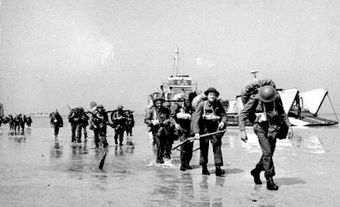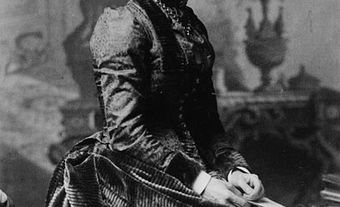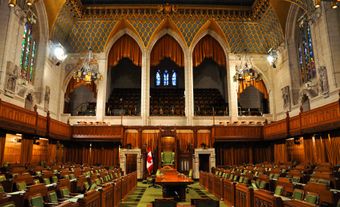William Lyon Mackenzie King, prime minister of Canada 1921–26, 1926–30 and 1935–48 (born 17 December 1874 in Berlin [Kitchener], ON; died 22 July 1950 in Kingsmere, QC). William Lyon Mackenzie King was the dominant political figure in an era of major changes. He was leader of the Liberal Party from 1919 to 1948, and Prime Minister of Canada for almost 22 of those years. King was Canada’s longest-serving prime minister. He steered Canada through industrialization, much of the Great Depression, and the Second World War. By the time he left office, Canada had achieved greater independence from Britain and a stronger international voice. It had also implemented policies such as employment insurance.

Early Life and Education
William Lyon Mackenzie King was born in Berlin (now Kitchener), Ontario, to lawyer John King and his wife Isabel, daughter of William Lyon Mackenzie, leader of the 1837 Rebellion in Upper Canada. He had three siblings: Isabel “Bella” Christina Grace (1873–1915), Janet “Jennie” Lindsey (1876–1962) and Dougall “Max” Macdougall (1878–1922). The family was close-knit but had little money. Known as “Willie” to his family, King was very close to his mother, who would have a lasting influence on his life and career.
In 1891, King enrolled at the University of Toronto, where he studied politics, economics, constitutional history and law. His family moved to Toronto soon after, where his father took up a part-time lectureship at Osgoode Hall Law School. King graduated with first-class honours and received his Bachelor of Arts in 1895, followed by a Bachelor of Laws in 1896 and Master of Arts in 1897 from the University of Toronto. He then undertook graduate work in political economy at the University of Chicago and at Harvard University, where he earned an MA in 1898. In 1900, he accepted a position with the newly formed Department of Labour, putting an end to his doctoral work at Harvard on labour conditions in the clothing industry. He was granted a PhD from Harvard in 1909.
As a young man, King became committed to social reform (but not socialism). He was inspired by the work of Arnold Toynbee, an English economic historian who was dedicated to improving the lives of the working class. A lifelong member of the Presbyterian Church, he was also influenced by the Social Gospel movement.

Journalism
As an undergraduate student, King was a regular contributor to the University of Toronto student newspaper, The Varsity. He subsequently wrote articles for the Toronto Evening News, the Toronto Star, the Toronto Globe, and the Mail and Empire (see Globe and Mail), among other publications.
Early Career in Labour and Industrial Relations
In 1900, King was offered a position with the new federal Department of Labour. That summer, he became the first editor of the Labour Gazette, the official journal published by the department between 1900 and 1978. In September, he became Canada's first deputy minister of labour. King’s interest in labour coincided with an expansion in manufacturing and increasing tension within industrial relations. As deputy minister of labour, King acted as conciliator in various strikes. He was the main influence behind the Industrial Disputes Investigation Act of 1907; it was a landmark law that delayed strikes or lockouts in public utilities or mines until a conciliation board achieved a settlement or published a report.
King then decided to leave the civil service and run for public office. In 1908, he was elected in North York as a Liberal. In 1909, he entered Sir Wilfrid Laurier’s Cabinet as minister of labour. King was defeated in the 1911 federal election and in the 1917 election, which centred on the issue of conscription. He maintained his connections with the Liberal Party. During the war, he acted as a labour consultant and was employed by the Rockefeller Foundation. His book Industry and Humanity (1918) outlined his view that there were four parties to industry: capital; management; labour; and society. King argued that government, acting on behalf of society, had an interest in the peaceful resolution of industrial disputes.
Prime Minister
At the 1919 Liberal leadership convention, King was elected as Sir Wilfrid Laurier’s successor. Two years later, the Liberals won a slim majority in the federal election; King became prime minister. He set out to regain the confidence of the farmers in Ontario and Western Canada who had supported the new Progressive Party; but his reductions in tariffs and freight rates were not enough. After the 1925 election, the Liberals could stay in office only with Progressive support. (See Elections of 1925 and 1926.)
During the first session of the new Parliament, it became clear that the Progressives would withdraw their support because of a scandal in the Department of Customs. King therefore asked Governor General Viscount Byng to dissolve Parliament. However, Byng refused and called on Arthur Meighen to form a Conservative government; however, it was defeated in the House of Commons a few days later. (See King-Byng Affair.)

In the 1926 election, King stressed the alleged unconstitutionality of Meighen’s government. (See also Constitution of Canada.) But the Liberal victory in that election really stemmed from the support of Progressives who preferred the Liberals to the high-tariff Conservatives.
In the prosperous years after 1926, King’s Liberal government proved cautious and reduced the federal debt. Its only initiative was an old-age pension scheme. King insisted on Canadian autonomy in relations with the United Kingdom. He also contributed to the definition of Dominion status at the 1926 Imperial Conference; according to the resultant Balfour Report, British dominions were defined as autonomous and equal members of the British Commonwealth of Nations. This satisfied King, who was loyal to the British empire but also championed sovereignty for Canada. (See also Chanak Affair; Halibut Treaty.)
The Great Depression
Despite King’s background in economics, he was reluctant to acknowledge the scale of the economic crisis in the 1930s. He did not even note the stock market crash of 1929 in his personal diary. King did not believe at first that the Depression would seriously affect Canada. He refused to provide federal funding to provinces struggling with unemployment. In contrast, the Conservatives under R.B. Bennett promised aggressive action. As a result, the Liberals were soundly defeated in the 1930 election.
King was an effective Opposition leader. He kept his party united as he attacked Bennett for unfulfilled promises and rising unemployment and deficits. King’s only alternative policy, however, was to reduce trade barriers. Bennett’s policies included work camps, the Prairie Farm Rehabilitation Act, the Canadian Wheat Board, and what was known as Bennett’s New Deal. They all failed to adequately address the country’s problems.
In 1935, the Liberal Party campaigned on the slogan “King or Chaos.” It was returned to office with a comfortable majority. King negotiated trade agreements with the US in 1935 and with the US and Great Britain in 1938. However, the economic downturn in 1937 left the government with high relief costs and no coherent economic response.
The Second World War
Developments abroad, from the Ethiopian crisis to the Munich crisis, forced King to pay more attention to international affairs. (See also Global Affairs Canada.) He hoped that war with Germany could be averted through appeasement. Like many other leaders of the time, King was impressed by Hitler when the two met in Berlin, Germany, on 29 June 1937. He wrote in his diary that Hitler “is really one who truly loves his fellow man.” Although they discussed many topics, King did not bring up the Nazi party’s anti-Jewish policies during the meeting. There was widespread discrimination against Jews even in Canada. The country’s immigration policy at the time was influenced by anti-Semitic views. (See also MS St. Louis.)
When they met in June 1937, Hitler reassured King that Germany had no desire for war. Events quickly revealed Germany’s true intentions, however, and King’s hopes of avoiding another war were dashed. As the likelihood of war increased, King insisted that the Canadian Parliament (not the British government) would decide on Canada’s participation. To make such a decision more palatable, particularly to French Canadians, he promised there would be no conscription for overseas service. Britain declared war on Germany in September 1939. The Canadian Parliament was recalled in an emergency session; with only token opposition, King declared that Canada was at war. (See Canada’s Road to the Second World War; Second World War.)

King called a snap election early in 1940. His government was returned with an increased majority. Co-operation between the government and business and labour leaders shifted Canadian industrial production to a wartime footing. As a result, unemployment fell dramatically. The remarkable industrial expansion involved special financial arrangements with the US and economic planning on a continental scale.
Also in 1940, King introduced unemployment insurance and his reconstruction program; based on Keynesian Economics, the latter included family allowances and proposals for health insurance. These measures were meant to placate Canadians who feared the return of the Depression after the war and who looked to the government for greater social security.

Early German victories during the war led some Canadians to advocate conscription. But King feared a political crisis and tried to compromise. In 1940, he introduced conscription for the defence of Canada only (i.e., men would not be conscripted to fight overseas). In a 1942 plebiscite, a majority of Canadians favoured relieving the government of its promise not to introduce conscription for overseas service; but Quebec voters were opposed. High casualties in 1944 and a declining rate of voluntary enlistment led to prolonged debates within the government; as well as the resignation of the minister of defence, James Layton Ralston. In November, King abruptly agreed to send some of the home-defence forces to Europe; the decision was grudgingly accepted by French Canadians. (See also Mackenzie King and the War Effort; Quebec Conferences 1943, 1944.)
The Liberals narrowly won the 1945 election. King did not play a decisive role in the postwar era. He preferred a minimal role for the government at home and abroad. He was persuaded to resign as prime minister in 1948 and was succeeded by Louis St-Laurent. King died two years later.
Controversial Beliefs
Mackenzie King’s political achievements have often been overshadowed by the revelation that this apparently proper and colourless man was a spiritualist; he frequently sought contact with his dead mother and with other deceased relatives and friends. King kept a detailed personal diary for much of his life. This diary was transcribed and published in a series of volumes edited by Pickersgill and Forster; it has provided biographers and historians with fascinating insight into King’s beliefs and his personal and spiritual life.
The publication of C.P. Stacey’s A Very Double Life in 1976 led to intense speculation about King’s sexual and spiritual life. He was presented as leading an almost Jekyll-and-Hyde existence. However, Allan Levine argues in King: William Lyon Mackenzie King: A Life Guided by the Hand of Destiny (2011) that King’s eccentricities in fact informed his political decisions, and that King’s faith and spirituality were an integral part of his personality.
Legacy
Mackenzie King has continued to intrigue Canadians. Critics argue that his political longevity was achieved by evasions and indecision, and that he failed to provide creative leadership. His defenders argue that he gradually changed Canada, a difficult country to govern, while keeping the nation united.

 Share on Facebook
Share on Facebook Share on X
Share on X Share by Email
Share by Email Share on Google Classroom
Share on Google Classroom






